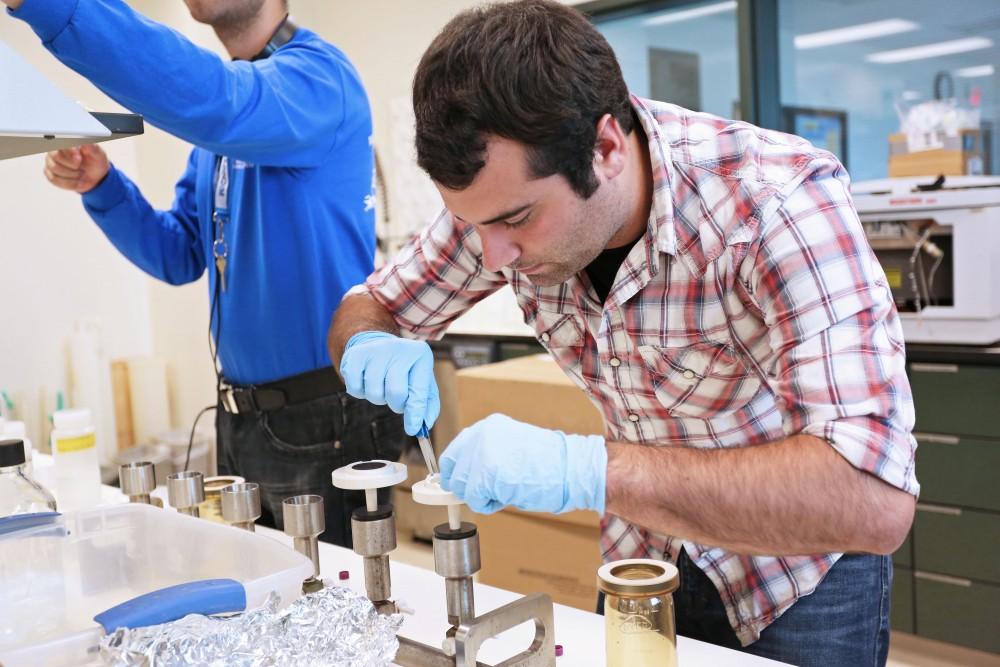GV’s Annis Water Research Institute formally partners with MSU

Drew McWilliams tests water from Lake Michigan for E-Coli inside of the Robert B. Annis Water Resource Institute (AWRI) in Muskegon on Wednesday, July 8, 2015. GVL/Archive
Feb 11, 2019
Research into water-related issues and threats continue to be a primary concern for Michiganders, whose identity is rooted in the Great Lakes; this is what makes Grand Valley State University’s Annis Water Resources Institute (AWRI) so essential to ongoing discussions about water. Recently, AWRI has partnered with Michigan State University’s Institute of Water Research (IWR) to collaborate on future water research projects.
“We’ve been working with different people at IWR since I’ve been here in 2001,” said AWRI Director Alan Steinman. “So this provides a really nice way for us to work on projects together and basically expand our intellectual capacity by joining the two universities.”
By combining resources and ideas, Steinman believes there can be many projects that benefit from the collaboration. One way specifically is the use of AWRI’s water crafts on Lake Michigan, which could become an even more exciting resource when paired with IWR’s specialty in wildlife and fisheries.
“I think MSU’s interest in us is they don’t have access to the Great Lakes,” Steinman said. “We have two vessels that fly the Great Lakes so I think this gives them an opportunity to get out on the lake if they want to do what we call open water, bluewater research on Michigan.”
Operating between April and October, AWRI’s research and education vessels, named D.J. Angus and W.G. Jackson, are equipped with hands-on water quality materials that can be used by various groups. Both water institutes have varying expertise in biosystems, aquatic ecology and water quality restoration, making their collaboration that much more beneficial for water research.
“MSU has a wealth of very talented folks working in the water arena, as do we, and often our expertises compliment each other,” Steinman said. “Their expertise in agricultural systems, in groundwater movement and modeling is certainly going to be a definite area that we will be exploring for opportunity.”
IWR’s work with groundwater research has already been underway for several years in Ottawa County. Following the loss of water pressure in two Allendale Township subdivisions and findings of high sodium chloride levels in some irrigated water systems, Ottawa County requested the help of IWR to conduct a study on the county’s groundwater.
“These challenges came forward to the Ottawa County Board of Commissioners and they immediately responded with a need to conduct an intensive scientific study to understand what is happening below our feet,” said Ottawa County Director of Planning and Performance Improvement Paul Sachs.
“When you look at where the emerging issues are around water in the state, groundwater is definitely a significant one,” Steinman said. “Ottawa County is sort of the bellwether for this in terms of the amount of groundwater that’s being extracted and not replaced.”
Some of the huge demands on groundwater that are causing these issues come from west Michigan’s agriculture industry, resulting in problems of both quality and quantity. IWR took seven years to complete the groundwater study and, with help from AWRI and Ottawa County, a groundwater management plan was created. Research into the county’s groundwater will likely remain constant as investigators attempt to reduce the amount of groundwater extracted and improve the recharge rates.
Looking at other areas of concern, Steinman believes the collaboration could also investigate some of the most prominent water issues in the state like PFAS contamination. Just last November, Michigan Senator Gary Peters held a hearing at GVSU’s Loosemore Auditorium in Grand Rapids to address arising PFAS concerns. PFAS chemicals pose a unique hazard to both humans and the local environment due to a lack in research regarding their long-term effects.
“When you talk about these kind of issues, one thing is going to be, what’s in front of us right now that’s sort of in crisis mode?” Steinman said. “Line 5, Flint, PFAS. I suspect you’re going to see PFAS all over this country, it just hasn’t been investigated yet. We are, for better or for worse, leading the charge.”
No specific projects have been identified yet for the collaboration, but it will likely provide research-based solutions for some locally prominent issues. Beyond the intersection of resources and ideas, the potential for undergrad and graduate student exchange could be possible through the water research collaboration. Currently, AWRI only offers a graduate program while IWR has both graduate and doctoral.
“I think the student exchange is certainly one way the education would be enhanced,” Steinman said. “So, there might be exchanges of our master student graduates if they want to go on to a PhD they could kind of slide into MSU.”
The exchange of resources, ideas and people will help foster the community within this water research collaboration which could change the landscape for problem solving in the area. The State of Michigan remains highly focused on water as more issues arise, not because of a lack of resources but rather a large water-based research community that tends to jump on these investigations sooner. Michigan is leading the charge in water research and hopefully the partnership of universities will provide another driving force to solving some of the most prominent water related issues here.
“Thinking about where these future issues are and developing the kind of models that need to be developed to plan accordingly for the future; that’s where this collaboration can be very positive,” Steinman said.

























